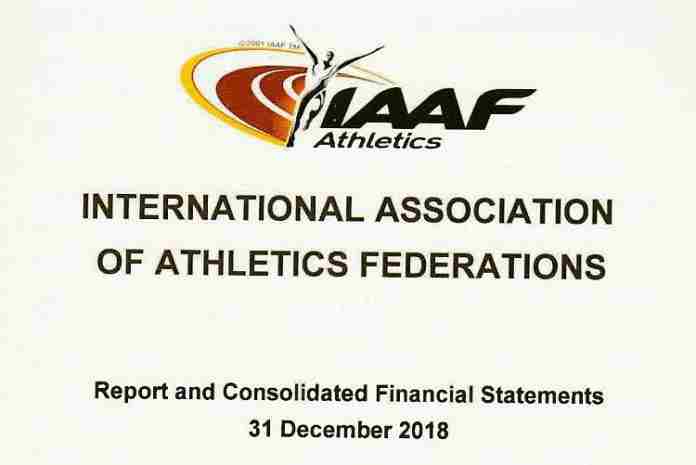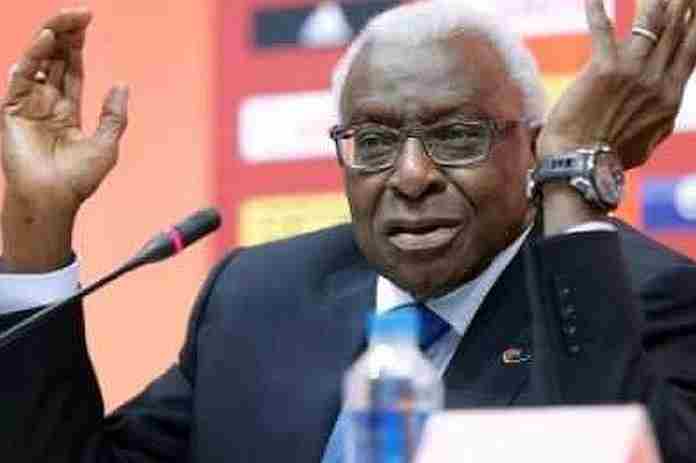This time, the information came in the mail.
Our 5 June exclusive, revealing for the first time the financial standing of the International Association of Athletics Federations (now World Athletics) was based on an unexpected call from an individual who had access to that data and just read it out over the telephone.
A few days later, a message was received from a different person – many thousands of miles away – asking if there was interest in seeing the entire document file of the IAAF’s 52nd Congress, held in Doha (QAT) last September.
Yes! Send it!
It’s a thick, elegant, double-comb-bound book of 306 pages, printed on heavy, coated paper stock with many color charts and photographs. It covers dozens of subjects, including committee reports, elections, financials and a lot more. Some federations such as the FEI (equestrian) and FISA (rowing) – and others – make these compilations public on their Web site for anyone interested to inspect. Any and every federation which says it believes in accountability and transparency should do this as well, NOW.
In the case of the IAAF, there was a lot to learn about its financial situation from seeing the complete financial report plus the accompanying notes … and some important commentary buried deeper in the documents.
First, a quick review of the financial statements as we previously reported:
● As of 31 December 2018, the IAAF had total assets of $59.52 million, with reserves of $45.25 million. That was down considerably from the 2017 figures of $77.79 million in assets and $64.80 million in reserves, reflecting a big loss in 2017.
● The 2018 activities statement showed a loss of $19.33 million, on revenue of $47.51 million and operating expenses of $66.84 million. There were additional investment losses, so the total losses for the year were $19.55 million.
● That was only slightly better than the $20.03 million loss for 2017, with just $40.54 million in revenue – in a World Championships year – and operating expenses of $60.10 million (plus some small investment losses).
So the federation lost $39.58 million in that two-year period, with the reserves falling from $84.83 million to $45.25 million at the end of 2018. Wow.
That’s what you get from the financial statements. The notes reveal more – a lot more – of the story:
● First off, the statements presented to the IAAF Council were, in fact, audited financials. Ernst & Young did the auditor’s review and stated that “In our opinion, the accompanying financial statements present fairly, in all material respects” the financial position of the IAAF as shown.
● On the revenue side, the financials show 94.2% ($44.76 million) came from television and sponsorships for 2018. This included $18.23 million from television rights, plus sponsorship income from the Japanese marketing giant Dentsu of $26.53 million.
The details are in Note 1, which explained:
“Television income from ESPN/EBU is received twice per year and covers the broadcast rights for all of the IAAF events for the year. The current agreement was signed in April 2018 and covers the period from January 01, 2018 to December 31, 2023. …
“Dentsu income is split into two parts: the first part corresponds to the Commercial rights and amounts to US $11m per year. The second part relates to TV rights in Japan and amounts to US$ 7m per year. The invoices are made on 4 equal installments per year and income is recognised as received during the year.
“During the year, an amendment was made to the agreement for the period of 2020-2029 was signed. The new agreement calls for a minimum guarantee over the 10-year period of US$ 130m. The agreement with Dentsu also included a profit share income. During 2018, there was a payment of US$ 8.396m received from Dentsu as profit share for the period of 2010-2017. The next payment for profit share will be made in 2020 for the period of 2018-2019. Revenue related to profit share will be recorded when cash is received by the IAAF.”
Note 11 identifies the television revenue as only “EBU,” which leads one to believe that the payments from ESPN (possibly partnered with NBC) are quite small. In any case, worldwide television rights for IAAF competitions brought in only $25.23 million for 2018; that’s depressing. Sponsorship of $11.00 million for 2018 only – not counting the 2010-17 profit-sharing – is also disappointing.
The IAAF also received an estimated $5.6 million in value-in-kind sponsorships n 2018, for which it paid commissions of $779,283 (13.9%).
● The IAAF spent $16.73 million for “events” in 2018, led by $4.55 million in spending for the Diamond League, $3.73 million for the Continental Cup in Ostrava (CZE), $3.04 million for the 2018 World Indoor Championships in Birmingham (GBR) and $1.34 million for the World U-20 Champs in Tampere (FIN). That’s 75.7% of the Events total; there was spending on seven other events as well.
● In a separate section on commissions was a very interesting report from the Audit and Finance Commission, chaired by former London 2012 Olympic Games chief executive Paul Deighton. Some highlights:
“This is the second year for EY as external auditor for the IAAF, and EY’s work this time has been much more straightforward due to the improvements in internal controls put in place by the CFO [Vineesh Kochhar] and his finance team. …
“Management had confirmed its assumption that the group remains a Going Concern and this assumption was considered reasonable and supportable by EY.”
The last item is a big deal to accounting geeks. It says that the auditors felt the IAAF was not in danger of a financial collapse, despite the major losses in 2017-18. With an expected $39.5 million coming from the IOC for the 2020 Olympic Games, this made sense from the viewpoint of the end of 2018. But with the 2020/1 Games now in jeopardy and normal television and sponsorship money vaporizing due to the coronavirus pandemic, is that still true today?
Some of those answers will come from the planned release of World Athletics financials for 2019 later this summer. More concerns from the commission report:
“The progress of the commercial programme has been encouraging, reflecting major improvements in the relationship with Dentsu and renewals by existing sponsors and broadcasters on improved terms.
“However, benefits will not materialise at the levels anticipated without the addition of significant new sponsors, and although the pipeline is active, to date these have not been secured. The commercial programme cannot be relied upon to cover expenditures at the current level, mandating a more disciplined approach to expense management.” (emphasis added)
This was a clear warning for the future, with the situation only worsening with the pandemic problems in 2020. The Audit and Finance Commission, created in 2016 to help the IAAF reclaim financial control after the Diack years, ended its work with the 2019 Congress and a new committee is being established under the direction of the new World Athletics Executive Board.
These are difficult times for World Athletics, as well as for so many other International Federations. As World Athletics chief Sebastian Coe (GBR) has repeatedly noted, there is a lot to do and steps have been taken to review (and change) and competition calendar to make it more fan-TV-sponsor friendly, attract more commercial interest and get some bridge financing from the International Olympic Committee. And the creation of the Athletics Integrity Group ($7 million cost in 2018) and the multiple legal and scientific challenges the federation has been involved in have also cost money.
One positive note, buried deep in the statements:
“On May 31, 2019, the IAAF received from the Russian Athletics Federation (RusAF) an amount of US$3.2m as reimbursement of costs incurred by the IAAF since the suspension of RusAF in 2015. This reimbursement includes expenses incurred by the IAAF till March 31, 2019.”
Rich Perelman
Editor
You can receive our exclusive TSX Report by e-mail by clicking here. You can also refer a friend by clicking here.


























